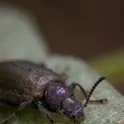Soil dwellers thrive in between solar panels: Here are five Frontiers articles you won’t want to miss
By Deborah Pirchner, Frontiers science writer Image: Shutterstock.com At Frontiers, we bring some of the world’s best research to a global audience. But with tens of thousands of articles published each year, it’s impossible to cover all of them. Here are just five amazing papers you may have missed. Solar parks can house semi-natural grassland communities Solar parks are sustainable ways to ensure clean energy. The ecosystems in which they are built are often sites that are excessively managed and affected by habitat destruction. This land management, however, also offers opportunity to restore or even create semi-natural grasslands. Researchers in France have studied 10 solar parks in the south of the country to examine plant community composition, soil biodiversity, and soil functioning under and outside of solar panels to test whether they hamper soil health. They have now published their results in Frontiers in Environmental Science. Their results indicate that the microclimate under panels influenced the abundance of soil megafauna, fungi biomass, and bacteria. Plant communities under panels tended to be made up of more shade-tolerant species, which reduced plant diversity and vegetation cover. Between panels, however, the researchers found more trophic interactions than outside or under solar panels. This suggested […]














